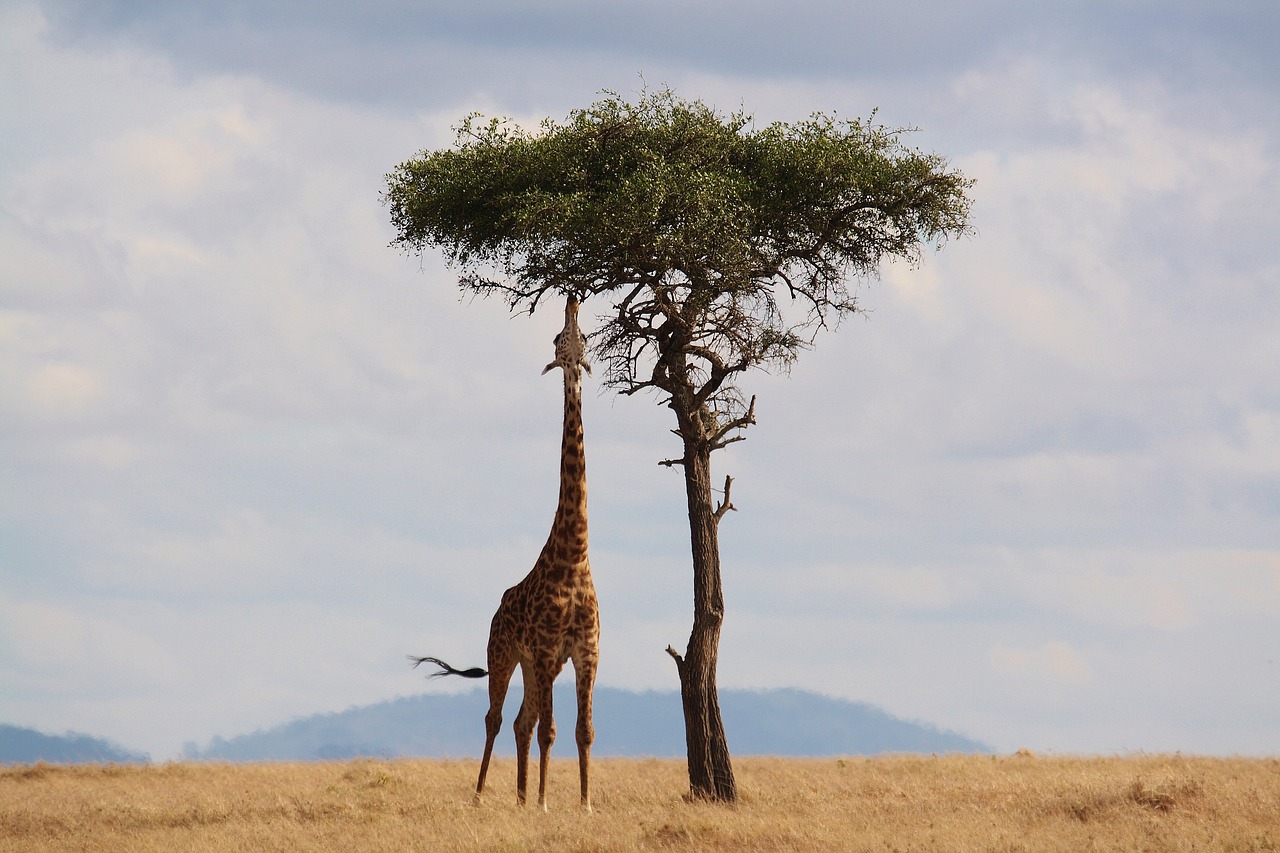South Africa, renowned for its awe-inspiring landscapes, diverse wildlife, and rich cultural heritage, has consistently been a top safari destination for wildlife enthusiasts worldwide. This country offers a myriad of safari experiences that thrill the senses, fostering a profound connection with nature. In this article, we traverse through the best places to go on safari in South Africa, exploring unique experiences that boast a rare blend of adventure, wildlife interaction, and eco-friendly accommodations. We also delve into immersive conservation experiences, offering insights into the delicate balance of our ecosystems and the efforts to preserve them.
1. Phinda Private Game Reserve
Located in KwaZulu-Natal, Phinda Private Game Reserve encompasses seven unique ecosystems and is known for its exclusive animal encounters. This game reserve is particularly recognized for its large cheetah population, along with the Big Five – lions, elephants, buffalo, leopards, and rhinoceros.
Unique Experience: Phinda’s “Cheetah Conservation Experience” is more than just a fleeting interaction with one of the world’s fastest animals; it’s a deep dive into the world of cheetah conservation. As cheetahs face threats from habitat loss, human-wildlife conflict, and poaching, this experience offers guests an opportunity to play an active role in their preservation.
Upon arriving at the reserve, participants are briefed by experienced conservationists who introduce them to the complex world of cheetah ecology and the challenges these creatures face. Equipped with this knowledge, visitors then venture out into the wilderness. Using telemetry and other tracking techniques, they get firsthand experience of how conservationists monitor the movements and health of these big cats. The thrill of walking in the wild, following the footprints of a cheetah, and eventually spotting one in its natural habitat is incomparable.
Moreover, the funds raised from this experience directly contribute to cheetah research, anti-poaching measures, and community outreach programs. This ensures that local communities are integrated into conservation efforts, creating a sustainable and harmonious relationship between humans and wildlife. Through the “Cheetah Conservation Experience,” visitors not only leave with memories of an encounter with these magnificent creatures but also with the satisfaction of having made a tangible contribution to their survival.

Eco-Friendly Accommodation: The award-winning andBeyond Phinda Forest Lodge, nestled within the reserve, is made up of stilted glass suites offering a minimalist design that blends seamlessly into the dense forest. The lodge is committed to sustainable operations, such as solar energy use and wastewater recycling.
2. Ngala Private Game Reserve
Sharing its borders with Kruger National Park, Ngala Private Game Reserve offers a rich wildlife experience, featuring the Big Five, along with rare species like the African wild dog.
Unique Experience: The “Rhino Notching Experience” offered at Ngala is not just an ordinary safari activity; it’s an invitation to partake directly in the frontline efforts to conserve one of Africa’s most iconic species. With rhino populations under severe threat from poaching for their horns, conservation strategies, like ear notching, become paramount in efforts to monitor and protect these majestic creatures.
Upon embarking on this unique experience, participants are briefed about the critical state of rhino populations, the challenges they face, and the need for interventions like notching. Accompanied by a team of experienced veterinarians and conservationists, visitors are taken into the heart of the reserve. The process involves carefully locating a rhino, ensuring minimal stress when it’s darted from a helicopter or vehicle. The tranquillized rhino is then approached on foot.
Ear notching is a procedure where small, unique patterns are cut into the rhino’s ears, serving as an individual identification method. This allows researchers and rangers to monitor specific rhinos, assessing their health, movement patterns, and potential threats.
But the experience doesn’t end there. Once the rhino awakens, the magic moment comes: witnessing the magnificent creature rise and return to its habitat, now with an identifier that boosts its chances of survival in the wild.
The fees paid by participants go directly back into rhino conservation, aiding further research, anti-poaching units, and community awareness programs. Thus, the “Rhino Notching Experience” provides visitors with a profound, hands-on understanding of conservation, empowering them to be ambassadors for these gentle giants long after their visit.
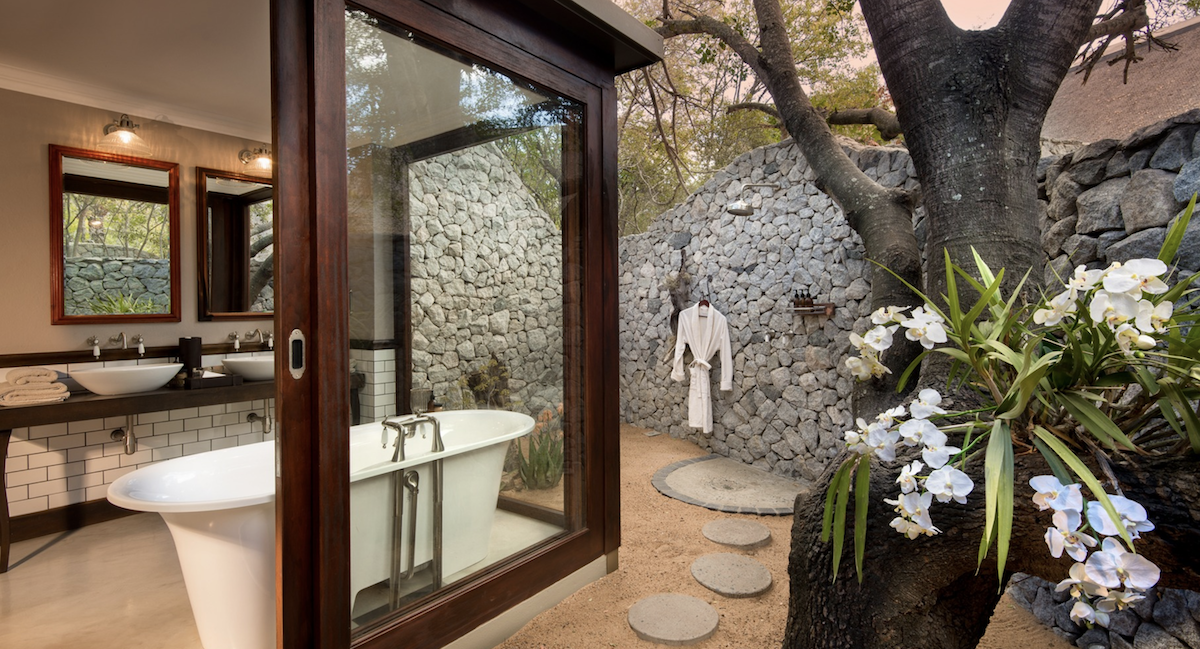
Eco-Friendly Accommodation: andBeyond Ngala Safari Lodge is renowned for its eco-friendly ethos, with an approach towards reducing water and energy consumption, and participating in local community development programs.
3. Eastern Cape Game Reserves
Eastern Cape Game Reserves are malaria-free zones, providing a safe and family-friendly safari experience. Reserves such as Shamwari Private Game Reserve and Addo Elephant National Park are home to the Big Five and offer fantastic bird-watching opportunities.
Unique Experience: At the heart of Shamwari Game Reserve’s commitment to conservation is their “Wildlife Rehabilitation Centre Experience”, a beacon for animal rescue, recovery, and release. This program invites visitors to delve into the intricate and compassionate world of wildlife rehabilitation, shedding light on the challenging yet rewarding journey of returning animals to the wild.
Upon entering the center, participants are greeted by experienced wildlife caregivers who share heartwarming and sometimes heartbreaking stories of the animals they’ve rescued. Many of these animals arrive injured, orphaned, or displaced due to human interference, natural disasters, or conflicts with other animals. The stories resonate deeply, highlighting the fragility of nature and the importance of human stewardship.
Visitors are given a tour of the facilities, from intensive care units to recovery enclosures, each designed to mirror the natural habitats of the animals. They witness firsthand the rigorous care protocols, from feeding schedules tailored to each species to physiotherapy sessions for injured animals, aiming to ensure they can thrive once released.
One of the most captivating elements of this experience is the release process. Guests might witness a bird, once unable to fly due to a wing injury, taking to the skies again, or a rehabilitated antelope confidently returning to its natural habitat. Such moments epitomize the essence of the center’s mission: to heal, nurture, and ultimately return each animal to where it belongs.
Additionally, the experience emphasizes the importance of community education. The center regularly hosts workshops for locals, particularly children, fostering a sense of respect and responsibility for the surrounding wildlife. By partaking in the “Wildlife Rehabilitation Centre Experience”, visitors not only gain insight into the world of animal care but also become a part of a broader narrative of hope, resilience, and coexistence.
Eco-Friendly Accommodation: Set within the captivating landscape of the Eastern Cape Game Reserves, the Kariega Game Reserve’s Main Lodge is a splendid example of eco-friendly hospitality. The lodge has been constructed using natural materials sourced locally, reducing its carbon footprint and promoting sustainability. Solar power is harnessed for energy requirements, and the lodge has robust water recycling systems in place. Furthermore, the Main Lodge plays an active role in various conservation projects in the reserve, directly contributing to the preservation of the local ecosystem. The blend of luxury and sustainability it offers makes the lodge an excellent choice for conscious travelers.
4. Sabi Sand Game Reserve
Adjacent to Kruger National Park, Sabi Sand Game Reserve is renowned for its high density of wildlife, especially leopards. The reserve is a part of the largest conservation area in South Africa.
Unique Experience: Sabi Sands’ “Leopard Conservation Experience” is a deep dive into the enigmatic world of one of Africa’s most elusive and iconic predators. It goes beyond the thrill of spotting a leopard in the wild; it’s an educational journey shedding light on the challenges faced by these magnificent felines and the paramount importance of their conservation.
From the onset, participants are immersed in a world of leopard biology, behavior, and ecology. Guided by experienced conservationists and researchers, visitors are introduced to the cutting-edge tracking and monitoring technologies employed in studying leopards. These technologies, from camera traps to radio collars, capture intimate details of the leopard’s life, revealing secrets about their territories, hunting patterns, and social behaviors.
As part of the experience, guests might have the opportunity to accompany researchers on a tracking expedition. This involves following the trails of these cats, interpreting their tracks, and potentially witnessing the process of collaring a leopard – a crucial practice that aids in monitoring and research. Witnessing a leopard up close in its natural habitat, while understanding the science and effort that goes into its conservation, is nothing short of transformative.
The experience also brings to the fore the challenges leopards face in the modern world. Habitat loss, human-wildlife conflicts, and poaching are some of the pressing issues these creatures confront. Guests learn about the multifaceted approaches to mitigate these threats, from community outreach programs that promote coexistence to anti-poaching patrols that safeguard the leopards and their habitat.
By the end of the “Leopard Conservation Experience”, visitors walk away with a profound appreciation for these majestic cats. But more than that, they leave with a deepened understanding of the intricate tapestry of conservation efforts that ensure the survival and flourishing of leopards for generations to come.
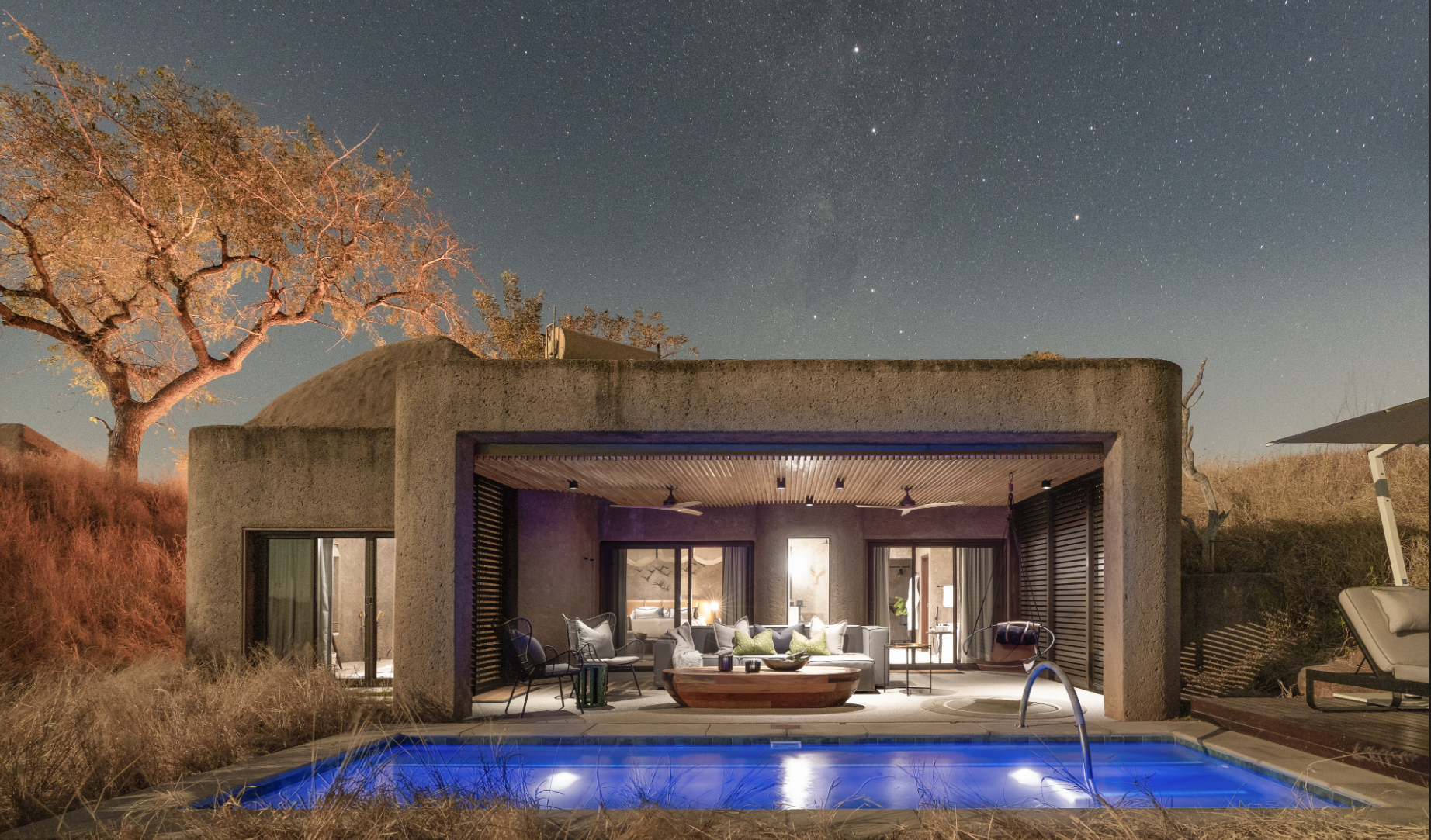
Eco-Friendly Accommodation: The Earth Lodge at Sabi Sabi Private Game Reserve represents an exquisite harmony of luxury and sustainability. Known for its eco-design, the lodge blends seamlessly into the surrounding landscape, offering an immersive experience while minimizing its environmental impact. The lodge is constructed using natural and recycled materials and operates on energy-efficient systems. Its commitment to sustainability extends to water conservation efforts and waste management. Guests at Earth Lodge can enjoy luxury in its most sustainable form, immersing themselves in the wild while contributing to a greener planet.
5. Madikwe Game Reserve
Madikwe Game Reserve, a hidden gem in the North West Province, is one of the largest game reserves in South Africa. It offers sightings of the Magnificient Seven, including the endangered African wild dog, cheetah and a range of bird species.
Unique Experience: The “Wild Dog Conservation Experience” at Madikwe is not just a wildlife sighting – it’s an immersive journey into the lives of one of Africa’s most fascinating, yet critically endangered predators. African wild dogs, with their distinctive mottled fur and pack dynamics, offer a riveting insight into the world of cooperative hunting and complex social structures.
From the outset, visitors are guided by seasoned conservationists and researchers who share their vast knowledge and passion for these incredible animals. Through captivating stories and factual presentations, participants are introduced to the intricacies of pack behavior. From the role of the alpha pair, the collective care of the pups, to the coordinated hunting strategies that make wild dogs one of the most successful predators in Africa, every detail is a revelation.
One of the highlights of the experience is the opportunity to embark on tracking expeditions. Using telemetry and other advanced tracking tools, guests are led into the heart of the reserve in pursuit of a wild dog pack. Observing these animals in their natural habitat, witnessing their interactions, and hearing the symphony of their vocalizations is a rare and enchanting experience. Such moments serve as live illustrations of the knowledge gained, making the experience both educational and awe-inspiring.
However, the experience is not just about understanding the wild dogs but also about comprehending the challenges they face in their fight for survival. With increasing habitat fragmentation, human-wildlife conflict, and diseases, the African wild dog population is under significant threat. The “Wild Dog Conservation Experience” delves deep into the strategies and measures employed to combat these threats, from anti-poaching units to community engagement initiatives that promote coexistence.
The culmination of the experience is often an interactive session, where guests can contribute ideas or get involved in ongoing projects, fostering a lasting bond with the species. As participants leave Madikwe, they carry with them not just memories but also an ignited passion to advocate for the preservation of these remarkable canines and the wild spaces they inhabit.
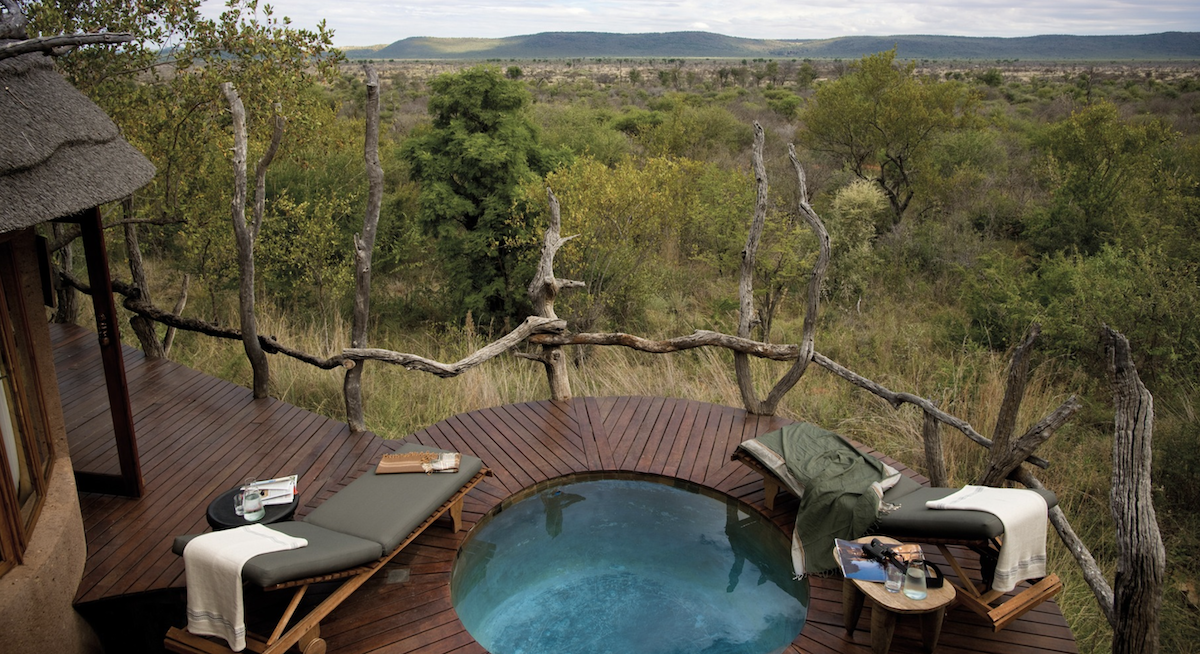
Eco-Friendly Accommodation: Eco-Friendly Accommodation: The andBeyond Madikwe Lodge in the heart of Madikwe Game Reserve stands as a beacon of sustainable tourism. Known for its eco-conscious ethos, the lodge has significant measures in place for reducing energy consumption and recycling waste. This beautiful retreat, boasting luxury accommodations, utilizes solar power to fuel its operations. Moreover, it contributes actively to local community development, offering a holistic approach to the safari experience that blends luxury with a strong sense of responsibility towards the environment.
6. Kruger National Park
Kruger National Park is one of the most famous safari destinations globally, offering vast landscapes and an impressive diversity of wildlife, including the Big Five, over 500 bird species, and multiple reptiles.
Unique Experience: The “Elephant Conservation Experience” at Kruger National Park is an emotive journey into the heart of the African elephant’s world, illuminating the beauty, intelligence, and challenges these iconic beings face in today’s rapidly changing environment.
Beginning with an interactive workshop, participants are introduced to the enigmatic world of elephants. Guided by elephant experts and conservationists, visitors are educated about the complex social structures, communication patterns, and intricate behaviors that define these giants. The matriarch-led herds, the playful antics of young calves, and the profound mourning rituals for deceased members showcase the deep emotional and cognitive capabilities of these creatures.
One of the most thrilling aspects of the experience is an up-close encounter with the elephants in their natural habitat. Safely guided by expert rangers, visitors have the privilege of observing these majestic animals, watching as they interact with their environment, forage, play, and communicate with one another. The sheer size and gentleness of these animals, combined with their undeniable presence, is a humbling sight, making it a moment many cherish for a lifetime.
However, the experience doesn’t merely focus on the grandeur of these animals. It also delves into the myriad challenges elephants face in the wild. From the ever-looming threat of poaching for ivory to habitat destruction and human-elephant conflicts, these giants are under continuous pressure. The “Elephant Conservation Experience” sheds light on the multifaceted efforts Kruger National Park undertakes to safeguard these creatures. This includes anti-poaching patrols, habitat restoration projects, and community outreach programs aimed at fostering a harmonious relationship between local communities and the park’s elephant populations.
As the experience draws to a close, visitors often participate in interactive sessions, discussing possible solutions, sharing insights, and even pledging support to ongoing conservation projects. Departing from Kruger, participants not only leave with a profound admiration for elephants but also a heightened sense of responsibility, often becoming ambassadors for the cause of their preservation.
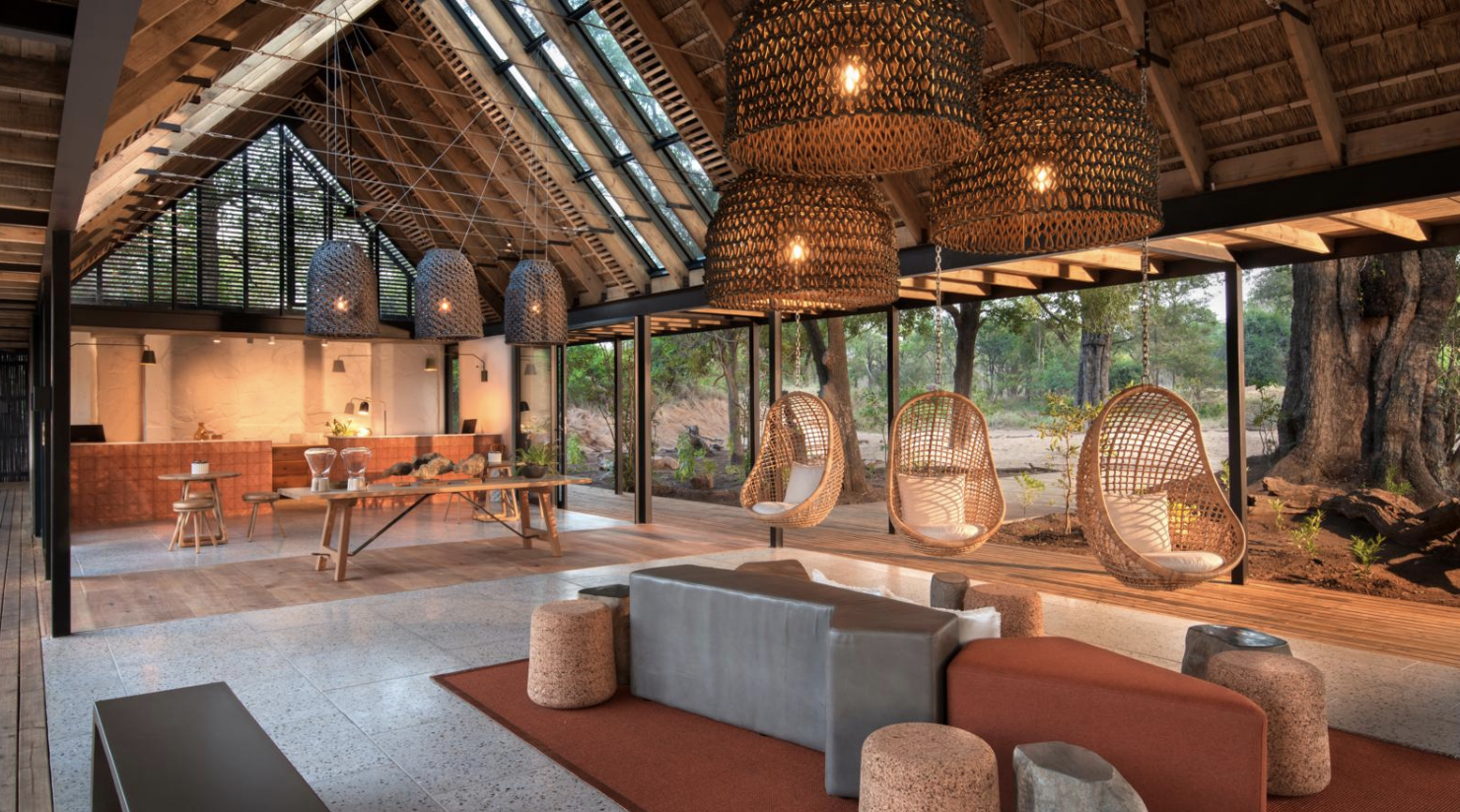
Eco-Friendly Accommodation: Nestled within the expanse of the iconic Kruger National Park, Lion Sands River Lodge stands as a testament to responsible luxury. The lodge is deeply committed to eco-conscious practices, and this commitment is reflected in its operation. The property makes extensive use of solar power for its energy needs, while rainwater harvesting and a waste treatment system ensure optimal use of resources. By choosing Lion Sands River Lodge, guests can enjoy a rich safari experience in the heart of the African wilderness, knowing they are contributing positively to the conservation of this beautiful ecosystem.
A safari in South Africa is not merely about witnessing the spectacle of wildlife; it is an immersive journey into conservation, sustainability, and the intricate balance of our ecosystems. Each of these reserves offers unique experiences that contribute to wildlife conservation, while simultaneously providing sustainable and luxurious accommodation options. Plan your South African safari to contribute to conservation efforts, connect with the natural world, and create unforgettable memories.
